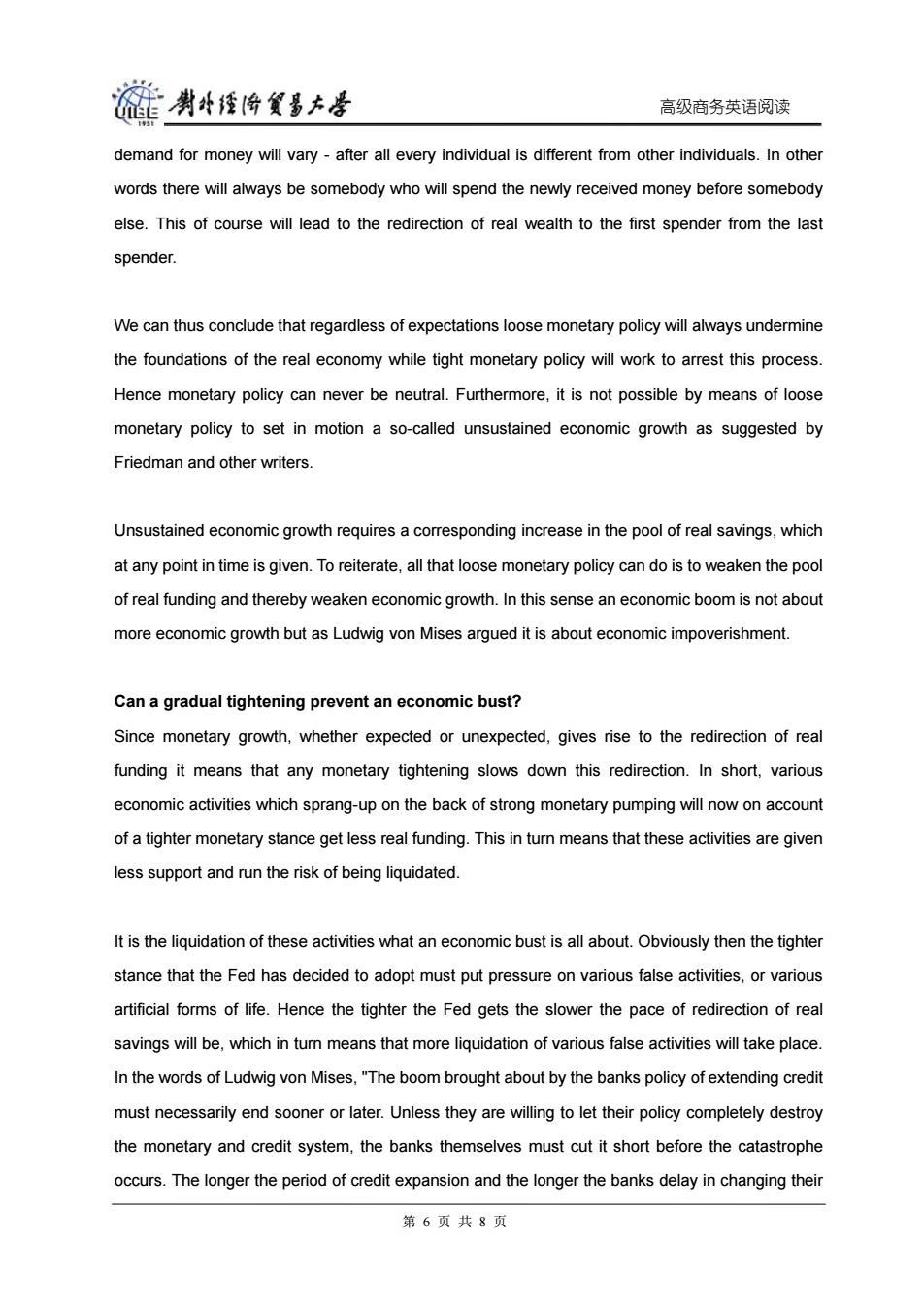正在加载图片...

剥牛煙将多大是 高级商务英语阅读 demand for money will vary-after all every individual is different from other individuals.In other words there will always be somebody who will spend the newly received money before somebody else.This of course will lead to the redirection of real wealth to the first spender from the last spender. We can thus conclude that regardless of expectations loose monetary policy will always undermine the foundations of the real economy while tight monetary policy will work to arrest this process. Hence monetary policy can never be neutral.Furthermore,it is not possible by means of loose monetary policy to set in motion a so-called unsustained economic growth as suggested by Friedman and other writers. Unsustained economic growth requires a corresponding increase in the pool of real savings,which at any point in time is given.To reiterate,all that loose monetary policy can do is to weaken the pool of real funding and thereby weaken economic growth.In this sense an economic boom is not about more economic growth but as Ludwig von Mises argued it is about economic impoverishment. Can a gradual tightening prevent an economic bust? Since monetary growth,whether expected or unexpected,gives rise to the redirection of real funding it means that any monetary tightening slows down this redirection.In short,various economic activities which sprang-up on the back of strong monetary pumping will now on account of a tighter monetary stance get less real funding.This in turn means that these activities are given less support and run the risk of being liquidated. It is the liquidation of these activities what an economic bust is all about.Obviously then the tighter stance that the Fed has decided to adopt must put pressure on various false activities,or various artificial forms of life.Hence the tighter the Fed gets the slower the pace of redirection of real savings will be,which in turn means that more liquidation of various false activities will take place. In the words of Ludwig von Mises,"The boom brought about by the banks policy of extending credit must necessarily end sooner or later.Unless they are willing to let their policy completely destroy the monetary and credit system,the banks themselves must cut it short before the catastrophe occurs.The longer the period of credit expansion and the longer the banks delay in changing their 第6页共8页高级商务英语阅读 demand for money will vary - after all every individual is different from other individuals. In other words there will always be somebody who will spend the newly received money before somebody else. This of course will lead to the redirection of real wealth to the first spender from the last spender. We can thus conclude that regardless of expectations loose monetary policy will always undermine the foundations of the real economy while tight monetary policy will work to arrest this process. Hence monetary policy can never be neutral. Furthermore, it is not possible by means of loose monetary policy to set in motion a so-called unsustained economic growth as suggested by Friedman and other writers. Unsustained economic growth requires a corresponding increase in the pool of real savings, which at any point in time is given. To reiterate, all that loose monetary policy can do is to weaken the pool of real funding and thereby weaken economic growth. In this sense an economic boom is not about more economic growth but as Ludwig von Mises argued it is about economic impoverishment. Can a gradual tightening prevent an economic bust? Since monetary growth, whether expected or unexpected, gives rise to the redirection of real funding it means that any monetary tightening slows down this redirection. In short, various economic activities which sprang-up on the back of strong monetary pumping will now on account of a tighter monetary stance get less real funding. This in turn means that these activities are given less support and run the risk of being liquidated. It is the liquidation of these activities what an economic bust is all about. Obviously then the tighter stance that the Fed has decided to adopt must put pressure on various false activities, or various artificial forms of life. Hence the tighter the Fed gets the slower the pace of redirection of real savings will be, which in turn means that more liquidation of various false activities will take place. In the words of Ludwig von Mises, "The boom brought about by the banks policy of extending credit must necessarily end sooner or later. Unless they are willing to let their policy completely destroy the monetary and credit system, the banks themselves must cut it short before the catastrophe occurs. The longer the period of credit expansion and the longer the banks delay in changing their 第 6 页 共 8 页